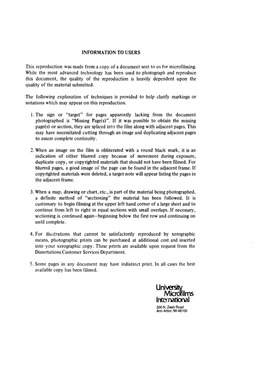| dc.contributor.author | Clapper, Thomas H., | en_US |
| dc.date.accessioned | 2013-08-16T12:28:53Z | |
| dc.date.available | 2013-08-16T12:28:53Z | |
| dc.date.issued | 1983 | en_US |
| dc.identifier.uri | https://hdl.handle.net/11244/5111 | |
| dc.description.abstract | An analysis of the four utopias demonstrates that conservatism has an ideology from which utopias can be formulated; that such utopias will not presume mankind to be perfect, good, equal one to another, or completely rational; that such utopias will be controlled by a natural elite; that the focus of action will be on the individual rather than on the state; that economic freedom will be emphasized rather than a planned affluent economy; and that strong government will be tolerated only in the areas of defense and other protective services. | en_US |
| dc.description.abstract | This dissertation answers the question, What would be the characteristics of a contemporary American conservative utopia? Conservative thought, which has a long tradition of hostility to utopian visions, is shown to be counter to utopian concepts only when conservatives are in power. Since American conservative thought is unlike that of European origin in that it does not have its values based in tradition, one might better understand the American version by studying its utopias. | en_US |
| dc.description.abstract | Since the New Deal, American conservative thought has primarily been negative in scope. It has been opposed to the policies of the New Deal and its subsequent heirs. This examination of positive proposals of the future by the American right differentiates it from European conservative utopias that call for a return to pastoral countrysides and a reinstatement of traditional social values. The American conservative utopias base their better world on the implementation of a capitalistic economic system. Unlike the utopias of the left, which stress socialism and increased power of the state, those of the right offer free enterprise-restricted governmental powers as an alternate vision of a better world. | en_US |
| dc.description.abstract | This study focuses on American conservative utopias written during the period from the end of the New Deal until the advent of the Nixon Administration as evidence that American conservatism can be and has been constructive in nature. The specific utopias examined are Atlas Shrugged by Ayn Rand, Alpaca Revisited by H. L. Hunt, Gumption Island by Felix Morley, and The Great Idea by Henry Hazlitt. Each of the four authors presents a fictional vision of a better world, a utopia based on conservative ideology. | en_US |
| dc.format.extent | vi, 350 leaves ; | en_US |
| dc.subject | Political Science, General. | en_US |
| dc.subject | Literature, American. | en_US |
| dc.title | American conservative utopias. | en_US |
| dc.type | Thesis | en_US |
| dc.thesis.degree | Ph.D. | en_US |
| dc.thesis.degreeDiscipline | Department of Political Science | en_US |
| dc.note | Source: Dissertation Abstracts International, Volume: 44-02, Section: A, page: 0564. | en_US |
| ou.identifier | (UMI)AAI8314761 | en_US |
| ou.group | College of Arts and Sciences::Department of Political Science | |
